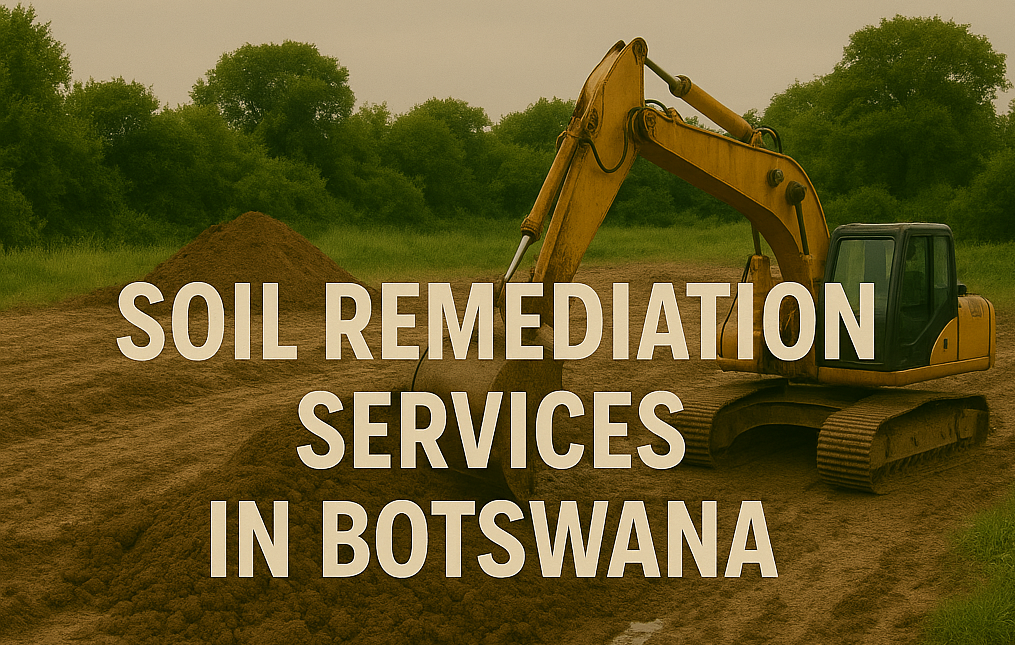Protecting Land and Water in a Semi-Arid Nation
Introduction
Botswana, famous for its diamond wealth, wildlife-rich landscapes, and semi-arid climate, faces an often-overlooked challenge of soil and groundwater contamination. With limited freshwater resources and heavy reliance on underground aquifers, any form of pollution has lasting consequences. Mining, agriculture, and expanding urban centers such as Gaborone and Francistown are placing pressure on fragile soils and groundwater systems. From chemical runoff in farming regions to heavy metal pollution in mining areas, soil degradation is increasingly threatening public health, food security, and long-term sustainability.
At The Ground Water Company, we deliver specialized soil remediation services across Botswana. Our mission is to rehabilitate degraded land, protect aquifers, and support industries, municipalities, and communities in meeting environmental standards while contributing to Botswana’s vision of sustainable growth.
What Is Soil Remediation?
Soil remediation is the process of cleaning up and restoring contaminated soil to make it safe for people, plants, and animals. It’s commonly used at sites where industrial activities, chemical spills, or improper waste disposal have polluted the ground.
In Botswana, the most common soil contaminants include:
- Petroleum hydrocarbons – from storage depots, transport corridors, and industrial facilities
- Heavy metals – from diamond, copper, and coal mining activities
- Chemical residues – from fertilizers, pesticides, and waste disposal
- Salinity and nitrates – from irrigation practices and agricultural runoff in semi-arid farming regions
Soil Contamination Challenges in Botswana
Botswana’s climate, economy, and resource dependence create unique contamination risks:
- Mining Legacy – Diamond and copper mines leave behind tailings and heavy metals that seep into soil and aquifers.
- Industrial Activity – Urban and industrial zones contribute petroleum hydrocarbons and chemical waste.
- Urban Growth – Expanding cities like Gaborone and Francistown struggle with waste management, sewage, and landfill pressures.
- Agricultural Pressure – Irrigation and fertilizer use in dryland farming increase soil salinity and nitrate levels.
- Water Scarcity – With little surface water and dependence on groundwater, contamination has long-term national impacts.
Our Soil Remediation Services in Botswana
At GWC, we design solutions tailored to Botswana’s semi-arid conditions and sensitive aquifers:
- Site Assessment & Soil Testing
Soil sampling and analysis to identify contaminants
Risk assessment for human health and environment
Geotechnical surveys to understand soil structure
- Excavation & Disposal
Removal of contaminated soil
Transport to licensed disposal facilities
Landfill management or off-site treatment
3.In-Situ Remediation Services
Bioremediation (using microbes or plants)
Chemical oxidation/reduction
Soil vapor extraction
Phytoremediation
4.Ex-Situ Remediation Services
Soil washing
Thermal desorption
Stabilization
5.Water Treatment
Pump and treat systems
Permeable reactive barriers
Containment systems
6.Monitoring & Reporting
Post-remediation soil testing
Environmental monitoring
Regulatory reporting and documentation
Why Soil Remediation Matters in Botswana
- Protects Groundwater Security – Ensures clean aquifers that sustain communities, industry, and agriculture
- Restores Land for Reuse – Makes contaminated land viable for safe redevelopment and farming
- Supports National Goals – Contributes to Botswana’s sustainability and environmental protection strategies
- Ensures Compliance – Meets Botswana’s environmental laws and international standards
- Safeguards Public Health – Reduces risks from toxic exposure and improves soil quality for both rural and urban populations
Other Ground water Services We Provide in Botswana
Beyond soil remediation, GWC also offers:
- Ground water exploration
- Ground water recharge
- Ground water contamination
- Dewatering solutions
- Flooding solutions
- Hydrological studies
- Ground water seepage
- Ground water remediation
- Flood risk assessment
Conclusion
Botswana’s reliance on mining, agriculture, and groundwater makes soil and water protection a national priority. Contamination is not only an environmental issue it directly affects food production, water security, and public health.


